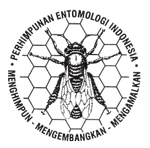Tipe peneluran, pengaruh lama ketiadaan inang, dan pakan terhadap keragaan reproduksi parasitoid Anagrus nilaparvatae Pang et Wang (Hymenoptera: Mymaridae)
DOI:
https://doi.org/10.5994/jei.13.3.127Keywords:
biological agents, proovigenic, Nilaparvata lugensAbstract
Anagrus nilaparvatae Pang et Wang (Hymenoptera: Mymaridae) is a major egg parasitoid of brown planthopper, Nilaparvata lugens Stal (Hemiptera: Delphacidae). The purpose of this study was to examine the egg development type, the effect of host deprivation and feeding on the reproductive performance of parasitoid. Determination of the egg development type was done by dissecting females of A. nilaparvatae upon emerging. Adult females aged 0, 1, 2, 3, 4, 5, and 6 hours were killed in the freezer. Abdominal of wasp was dissected by micro pin. Mature egg of wasp were calculated and documented. Treatment of host deprivations were conducted by feeding 10% honey solution and depriving female parasitoids of host for 3, 6, 9, 12, and 18 hours consecutively. After treatments, female parasitoids were given hosts every day until the parasitoids died. Another group of parasitoids were given with water and treated with the same lenght of deprivation period. Results showed that the A. nilaparvatae egg development type is proovigenic. The egg maturation of parasitoid has been initiated since it first emerge with 75% mature eggs of potential fecundity. In the conditions provided 10% honey solution or water as feed, reproductive performance of A. nilaparvatae decreased with increasing duration of host deprivation period, include realized fecundity, parasitization rate, and longevity of female wasp. The decline in the reproductive performance was done by host deprivation for 9 to 18 hours. Longevity of female wasps varied from one to three days, with higher and lower values consecutively for 9 and 18 hours of host deprivation period.
Downloads
Downloads
Published
How to Cite
Issue
Section
License
Copyright (c) 2017 Jurnal Entomologi Indonesia

This work is licensed under a Creative Commons Attribution 4.0 International License.
Authors who publish with this journal agree to the following terms:
- Authors retain copyright and grant the journal right of first publication with the work simultaneously licensed under a Creative Commons Attribution 4.0 International License that allows others to share the work with an acknowledgement of the work's authorship and initial publication in this journal.
- Authors are able to enter into separate, additional contractual arrangements for the non-exclusive distribution of the journal's published version of the work (e.g., post it to an institutional repository or publish it in a book), with an acknowledgement of its initial publication in this journal.
- Authors are permitted and encouraged to post their work online (e.g., in institutional repositories or on their website) prior to and during the submission process, as it can lead to productive exchanges, as well as earlier and greater citation of published work (See The Effect of Open Access).








